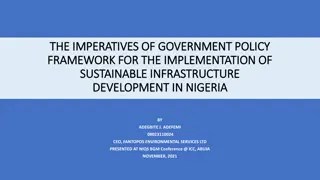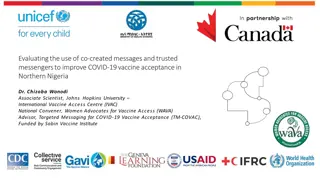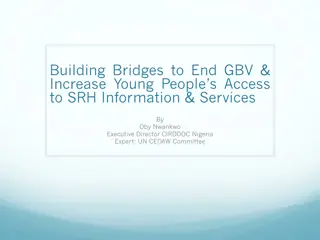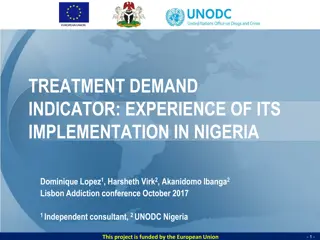Local Based Programing Experience in NE Nigeria
CRS Director Donal Reilly shares insights on local based programming experience in NE Nigeria, emphasizing reinforcing national and local systems, empowering communities, and transcending divides for collective outcomes in support of the 2030 Agenda. The use of private funds to explore area-based programming, integral human development framework, and integrated emergency response and recovery in the context of challenges faced in the NE region.
Download Presentation

Please find below an Image/Link to download the presentation.
The content on the website is provided AS IS for your information and personal use only. It may not be sold, licensed, or shared on other websites without obtaining consent from the author.If you encounter any issues during the download, it is possible that the publisher has removed the file from their server.
You are allowed to download the files provided on this website for personal or commercial use, subject to the condition that they are used lawfully. All files are the property of their respective owners.
The content on the website is provided AS IS for your information and personal use only. It may not be sold, licensed, or shared on other websites without obtaining consent from the author.
E N D
Presentation Transcript
Local Based Programing CRS experience in NE Nigeria Donal Reilly, Director Technical Assistance HRD,
Message from UNSG WHS report CORE RESPONSIBILITY FOUR Change people s lives From delivering aid to ending need Reinforce, do not replace, national and local systems Enable people to be the central drivers in building their resilience Deliver collective outcomes: transcend humanitarian-development divides Commit to the following in order to move beyond traditional silos, work across mandates, sectors and institutional boundaries and with a greater diversity of partners toward ending need and reducing risk and vulnerability in support of national and local capacities and the achievement of the 2030 Agenda.
Background Used private funds to see what we could learn and how we could influence a shift to area based programming. Area Based Programming; Community centered Integrated programming Facilitates localization Area based coordination
Integral Human Development Framework Outcomes Shocks, Cycles & Trends Strategies Structures & Systems (Institutions; value systems; policies; power structures; social, economic, religious and political systems; beliefs) ASSETS Spiritual & Human Access Physical Social Influence Natural Political Financial Feedback = Opportunities or Constraints 5
Integrated Emergency Response and Recovery Key Elements: Community/household needs centered approach. (bottom-up). Committing to accompanying communities through the emergency response and recovery process. Zonal/area operational approach. Single point of coordination with communities with regards to assistance and services. Single point of coordination with the local authorities. Integrated technical provided to those leading at the area level. Area level responsible for reporting up (multi sector) to next level. Flexible adapted to the given context.
On the ground in the NE Official coordination systems were not functioning. Local area coordination (LAC) groups managed by NGOs sprung up to respond to challenges in field-level coordination. July 1, 2017, the UN and INGOs agreed to formalize LGA coordination in Borno, Yobe and Adamawa states. The Humanitarian Country Team endorsed this formalization and agreed that INGOs will be the lead agencies for coordination at the LGA-level. Cholera outbreak
KEY ACHIEVEMENTS: Successful coordination of the cholera response was achieved because; INGOs working in Muna Corridor have been well-represented in on-going LAC meetings. Muna Corridor mapping of actors, completed before the cholera cases as a part of LAC efforts, was pivotal in facilitating the initial coordination; and LAC leadership engaged early, coordinating a local area response plan as soon as suspected cases were reported. There was a clear sense of responsibility of LAC leadership to act.
CHALLENGES Due to high staff turnover, organizational contact points needed to be updated at the outset of the emergency and this took time to address; Many actors were not accustomed to thinking spatially or using maps. There was no standard approach for hygiene promotion adopted by all WASH actors and not all agencies had trained hygiene promoters in cholera prevention and response messaging prior to this outbreak; Some actors did not promptly follow-up on commitments they made or initially acknowledge they needed additional support. LAC co-leads did not consult with the local government officials early in the process
LESSONS LEARNT The LAC leads were able to quickly coordinate a response to the cholera outbreak due to the pre-existing LAC network. LAC Terms of Reference (TOR) should be formalized, in conjunction with and buy-in from implementing organizations, the local and state government, sector coordinators, and OCHA; Local and state government should be included as soon as possible in coordination efforts; Having a Program Manager who could focus on the coordination and implementation of the response as the highest priority was essential Having Information Management specialist staff present was crucial to the process, in order to maintain data bases, coverage maps and activity plans/reporting; Using maps at meetings and collaborating with actors to improve maps may help habituate actors to leveraging these tools to improve coverage Establish geographical boundaries of operation by easily identifiable natural or man- made features, such as streams or roads, may facilitate geographic coverage in urban areas.
Going Forward Area Based Programming is possible if; - Donors fund integrated programming. - Donors fund Coordination and IM positions. - NGOs invest in IM. - NGOs have strong community engagement capability. - NGOs have multi-sector capability, - Or collaborate with others to provide sector specific services























